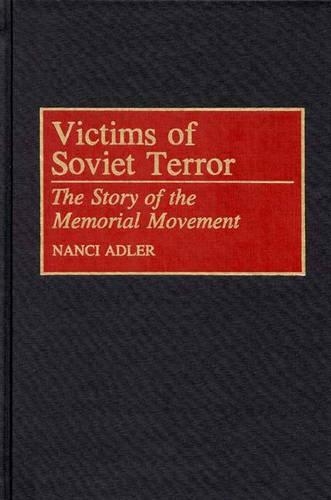
Victims of Soviet Terror: The Story of the Memorial Movement
(Hardback)
Publishing Details
Victims of Soviet Terror: The Story of the Memorial Movement
By (Author) Nanci D. Adler
Bloomsbury Publishing PLC
Praeger Publishers Inc
30th July 1993
United States
Classifications
Tertiary Education
Non Fiction
Human rights, civil rights
322.40947
Physical Properties
Hardback
200
Width 156mm, Height 235mm
510g
Description
Memorial began as a group of dissidents who secretly met to exchange stories of Stalinist repression, make contacts, and collect whatever records they could obtain to establish historical truths about Soviet totalitarianism. In Victims of Soviet Terror, Nanci Adler records how Memorial grew from a suspect organization to a powerful human rights movement that collects and disseminates information about Stalinism's crimes and has established a monument to the millions persecuted by the K.G.B. across from the Lubyanka, the shrine of totalitarianism. Using Memorial's own documents, interviews with its founders and supporters, and Soviet and Western news accounts, Adler examines Memorial's functions as a historical society and political force, particularly its efforts to posthymously try Stalin and Stalinist leaders for crimes against the Soviet people.
Reviews
Memorial, an organization with chapters spanning the former Soviet republics, seeks to honor the victims of Stalinism, aid remaining survivors, and preserve the record of Stalinist suffering and dissidence through research centers and programs. A Memorial monument now stands before the former KGB headquarters in Moscow. Adler, a member of the Geneva Institute on Psychiatry and Amsterdam's Second World Center, describes the rise of Memorial from a handful of citizens taking donations in 1987 to a semiofficially sanctioned organization in 1990. She reviews pertinent Soviet history and examines current aims of the organization. Through the group's documents, news articles, and interviews, the book reveals the role and influence of Memorial, particularly in political activities. This...study is clearly written and offers scholars of Stalinism a solid briefing of this movement.-Library Journal
The future role of Memorial in a democratic Russia is far from clear, but surely no less vital than its efforts in the past. Already certain small but vocal groups in Russia call for a return to the "efficiency" and "orderliness" of Soviet (read: Stalinist) regime. Books like Adler's are important in countering this version of "revisionist history" by describing the horrors of the Stalinist period and perhaps even more by recounting the harassment, arrests, and insults endured by even the modest "dissidents" of the Memorial group during the "liberal" Gorbachev period. Adler's book should be read with interest by political scientists, journalists, and anyone interested in recent Russian history.-Journal of Baltic Studies
"The future role of Memorial in a democratic Russia is far from clear, but surely no less vital than its efforts in the past. Already certain small but vocal groups in Russia call for a return to the "efficiency" and "orderliness" of Soviet (read: Stalinist) regime. Books like Adler's are important in countering this version of "revisionist history" by describing the horrors of the Stalinist period and perhaps even more by recounting the harassment, arrests, and insults endured by even the modest "dissidents" of the Memorial group during the "liberal" Gorbachev period. Adler's book should be read with interest by political scientists, journalists, and anyone interested in recent Russian history."-Journal of Baltic Studies
"Memorial, an organization with chapters spanning the former Soviet republics, seeks to honor the victims of Stalinism, aid remaining survivors, and preserve the record of Stalinist suffering and dissidence through research centers and programs. A Memorial monument now stands before the former KGB headquarters in Moscow. Adler, a member of the Geneva Institute on Psychiatry and Amsterdam's Second World Center, describes the rise of Memorial from a handful of citizens taking donations in 1987 to a semiofficially sanctioned organization in 1990. She reviews pertinent Soviet history and examines current aims of the organization. Through the group's documents, news articles, and interviews, the book reveals the role and influence of Memorial, particularly in political activities. This...study is clearly written and offers scholars of Stalinism a solid briefing of this movement."-Library Journal
Author Bio
NANCI D. ADLER a graduate of Columbia University and the University of Amsterdam (the Netherlands), is with the Geneva Initiative on Psychiatry and the Second World Center in Amsterdam. She is a contributor to numerous journals.
